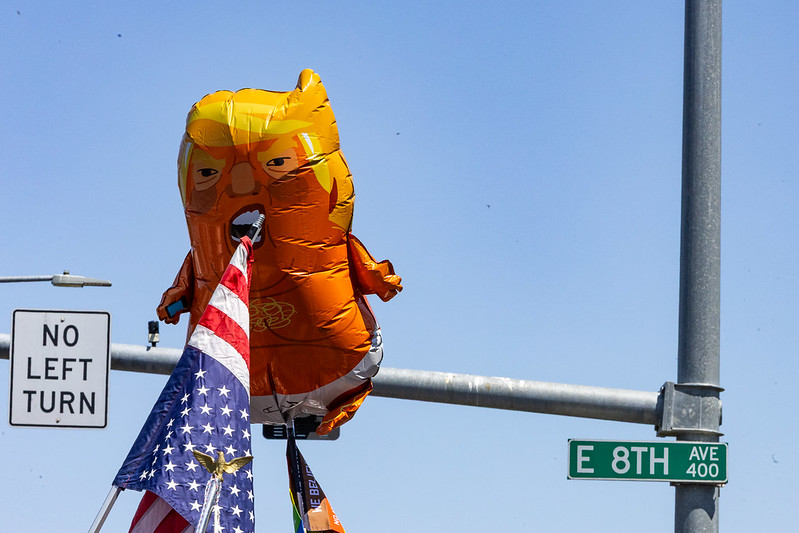Politics
Media’s Response to Trump’s Attacks Tests Limits of Free Speech

Donald Trump’s ongoing disputes with media organizations highlight a contentious relationship that raises significant questions about freedom of speech and press in the United States. His administration’s tactics, including lawsuits and regulatory threats, have led some networks to reconsider their approach to political commentary, particularly when it comes to satire and criticism.
Trump’s response to comedic jabs often illustrates his sensitivity to public perception. His reactions can be swift and severe, as evidenced by his public outrage following comments made by comedians like Jimmy Kimmel. During his presidency, Trump frequently utilized platforms such as Truth Social to express dissatisfaction with media portrayals, often labeling them as unfair or inaccurate. This was notably the case when he responded to Kimmel’s remarks following the murder of Charlie Kirk. Anticipating possible repercussions, ABC preemptively suspended Kimmel, indicating the influence of Trump’s threats.
This pattern of behavior extends beyond individual comedians. Trump has targeted major networks like ABC and CBS, using legal action to assert pressure. For instance, his administration sought punitive measures against ABC News after George Stephanopoulos referred to an incident involving E. Jean Carroll as “rape.” Despite a court ruling indicating the remark was a fair representation, ABC opted for a settlement rather than a legal battle, showcasing a troubling trend of self-censorship among media companies.
Corporate Response to Trump’s Tactics
As Trump continues to wield influence over media narratives, corporations have begun to assess the financial implications of their decisions. The response to Trump’s lawsuits indicates a prioritization of profit over principles of free speech. In the case of CBS, Trump’s claims about a “60 Minutes” interview with Kamala Harris prompted the network to settle, avoiding a legal confrontation that could have reinforced the integrity of journalistic standards.
This reluctance to confront Trump has not gone unnoticed. Both The New York Times and The Wall Street Journal have maintained a staunch defense of their reporting, even in the face of Trump’s attempts to stifle dissent through legal action. Their resilience has highlighted a critical distinction between organizations willing to stand firm for the First Amendment and those that capitulate to fear.
The recent reinstatement of Kimmel by ABC, prompted by a public backlash against the network’s initial suspension, demonstrates the potential power of audience response. Viewers expressed their discontent through boycotts of Disney, ABC’s parent company, reflecting the idea that corporations ultimately serve their consumers. This incident illustrates a shift in dynamics where public outrage can reinstate comedic voices that challenge political figures.
Implications for Freedom of Speech
The ongoing struggle between Trump and media outlets raises vital questions about the state of free speech in America. As networks like CBS and ABC prioritize corporate interests, the implications for political satire and critique become increasingly concerning. The media environment risks becoming one where fear of reprisal stifles creativity and commentary.
The trend of corporate acquiescence to Trump’s threats may embolden further attempts to undermine the integrity of the press. This could create a chilling effect on journalists and comedians alike, inhibiting their ability to engage in discourse essential for a democratic society.
Ultimately, the relationship between Trump and the media underscores the importance of defending the principles enshrined in the Constitution. As audiences become more aware of these dynamics, their collective actions may serve as a counterbalance to corporate fears, ensuring that freedom of expression remains a cornerstone of public discourse.
In a landscape where financial interests often dictate content, the resilience of organizations committed to upholding journalistic integrity becomes more crucial than ever. As demonstrated by the reactions to Trump’s administration, the challenge lies not just in confronting political figures but in ensuring that the media continues to serve its vital role in democracy.
-

 Health3 months ago
Health3 months agoNeurologist Warns Excessive Use of Supplements Can Harm Brain
-

 Health3 months ago
Health3 months agoFiona Phillips’ Husband Shares Heartfelt Update on Her Alzheimer’s Journey
-

 Science1 month ago
Science1 month agoBrian Cox Addresses Claims of Alien Probe in 3I/ATLAS Discovery
-

 Science1 month ago
Science1 month agoNASA Investigates Unusual Comet 3I/ATLAS; New Findings Emerge
-

 Science4 weeks ago
Science4 weeks agoScientists Examine 3I/ATLAS: Alien Artifact or Cosmic Oddity?
-

 Entertainment4 months ago
Entertainment4 months agoKerry Katona Discusses Future Baby Plans and Brian McFadden’s Wedding
-

 Science4 weeks ago
Science4 weeks agoNASA Investigates Speedy Object 3I/ATLAS, Sparking Speculation
-

 Entertainment4 months ago
Entertainment4 months agoEmmerdale Faces Tension as Dylan and April’s Lives Hang in the Balance
-

 World3 months ago
World3 months agoCole Palmer’s Cryptic Message to Kobbie Mainoo Following Loan Talks
-

 Science4 weeks ago
Science4 weeks agoNASA Scientists Explore Origins of 3I/ATLAS, a Fast-Moving Visitor
-

 Entertainment4 months ago
Entertainment4 months agoLove Island Star Toni Laite’s Mother Expresses Disappointment Over Coupling Decision
-

 Entertainment3 months ago
Entertainment3 months agoMajor Cast Changes at Coronation Street: Exits and Returns in 2025









